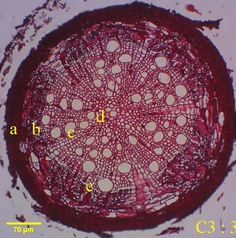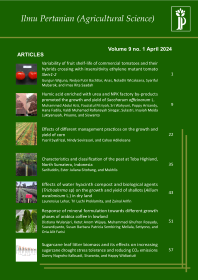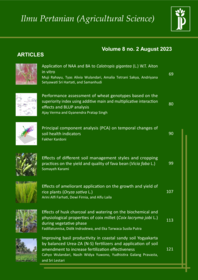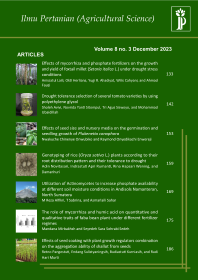
Anatomical characteristics of cocoa plant roots as affected by the levels of calcium fertilization
Sutan Tarmizi Lubis(1*), Eka Tarwaca Susila Putra(2), Budiastuti Kurniasih(3)
(1) Departement of Agronomy, Faculty of Agriculture, Universitas Gadjah Mada, Jln. Flora No. 1, Bulaksumur, Sleman, Yogyakarta 55281, Yogyakarta
(2) Departement of Agronomy, Faculty of Agriculture, Universitas Gadjah Mada, Jln. Flora No. 1, Bulaksumur, Sleman, Yogyakarta 55281, Yogyakarta
(3) Departement of Agronomy, Faculty of Agriculture, Universitas Gadjah Mada, Jln. Flora No. 1, Bulaksumur, Sleman, Yogyakarta 55281, Yogyakarta
(*) Corresponding Author
Abstract
Cocoa plant (Theobroma cacao L.) is one of good annual crops grown in Indonesia. The disadvantages and advantages of Ca in plants can affect morphology and anatomy in plants. This research aimed to identify the effect of Ca on the anatomical performance of the roots of cocoa plants and determine the optimal dose of Ca for the anatomical characteristics of the roots of cocoa plant. The research was conducted at the cocoa plantation owned by PT. Pagilaran at North Segayung Production Unit, Tulis Subdistrict, Batang Regency, Central Java, in October 2019 – February 2021. The observation of root anatomy was carried out by making preparations, and the plant roots were taken destructively and sliced transversely. The field experiment was arranged using a single factor randomized complete block design. The treatments consisted of without fertilizer application and calcium fertilization at a dose of 100 g/tree/year, 200 g/tree/year, 300 g/tree/year, and 400 g/tree/year. The cocoa clone used was clone RCC 71. The results showed that an increase in the dose of CaCl2 fertilizer up to 400 g/tree/year was generally followed by an increase in the size of the xylem and phloem diameters, the thickness of the cork layer, the thickness of secondary cortex, and the diameter of the stele. The quadratic effect of the dose of CaCl2 fertilizer was observed only on the thickness of the root cambium tissues. Thus, it is necessary to conduct further research to determine the optimal dose of Ca fertilizer for the anatomical characteristics of cocoa roots.
Keywords
Full Text:
PDFReferences
Aras, S., Keles, H., and Bozkurt, E. (2021). Physiological and histological responses of peach plants grafted onto different rootstocks under calcium deficiency conditions. Sci. Hortic., 281, pp. 109967.
Atkinson, C., J. (2014). Is xylem sap calcium responsible for reducing stomatal conductance after soil liming?. Plant Soil, 382, pp. 349-356.
Badrie, N., Bekele, F., Sikora, E., and Sikora, M. (2014). Cocoa agronomy, quality, nutritional, and health aspects. Critical Reviews in Food Science and Nutrition, 55(5), pp. 620–659.
Soil Research Center. (2009). Technical instructions: chemical analysis of soil, plants, water, and fertilizers. 2nd ed. Bogor: Soil Research Center, pp. 362-368.
Bauer, P., Elbaum, R., and Weiss, I.M. (2011). Calcium and silicon mineralization in land plants: transport, structure and function. Plant Science, 180(6), pp. 746-756.
Bothe, H. (2015). The lime-silicate question. Soil biology & biochemistry, 89, pp. 172-183.
Cacho, M., Dominguez, A.T., and Elena‐Rosselló, J.A. (2013). Role of polyamines in regulating silymarin production in Silybum marianum (L.) Gaertn (Asteraceae) cell cultures under conditions of calcium deficiency. Journal of Plant Physiology, 170, pp. 1344–1348.
Carr, M.K.V. (2012). Advances in Irrigation Agronomy Plantation Crops. Cambridge: University Press.
Charpentier, M. and Oldroyd, G.E.D. (2013). Nuclear calcium signaling in plants 1. Plant Physiology, 163(2), pp. 496-503.
Directorate General of Estate. (2020). Cocoa Production by Province in Indonesia 2017-2020. Available at:https://www.google.com/search?q=produksi+kakao+di+indonesia+2020&oq=produksi+kakao+2019&aqs=chrome.2.69i57j0i22i30l5.10053j0j7&sourceid=chrome&ie=UTF-8 [Accessed 25 Juni 2021].
Domingues, L.S., Ribeiro, N.D., Andriolo, J.L., Possobom, M.T.D.F., and Zemolin, A.E.M. (2016) . Growth, grain yield and calcium, potassium and magnesium accumulation in common bean plants as related to calcium nutrition. Acta Scientiarum. Agronomy, 38(2), pp.207-217.
Dorozhkin, S.,V. (2017). Les orthophosphates den calcium (CaPO4): occurrence etpropriétés. Morphologie, 101(334), pp. 125-142.
Du, E., Dong, D., Zeng, X., Sun, Z., Jiang, X., and de Vries, W. (2017). Direct effect of acid rain on leaf chlorophyll content of terrestrial plants in China. Science of the Total Environment, 605-606, pp. 764-769.
Freitas, S.T., Amarante, C.V.T., and Mitcham, E.J. 2015. Mechanisms regulating apple cultivar susceptibility to bitter pit. Scientia Horticulturae, 186, pp. 54–60.
Grusak, M.A., Broadley, M.R., and White, P.J. (2016). Plant macro- and micronutrient minerals. Ecyclopedia of Life Science, pp. 1–6.
He, H., Veneklaas, E.J., Kuo, J., and Lambers, H. (2014). Physiological and ecological significance of biomineralization in plants. Trends in Plant Science, 19(3), pp. 166-174.
Inácio, V., Martins, M. T., Graça, J., and Cecílio, L. M. (2018). Cork oak young and traumatic periderms show PCD typical chromation patterns but different chromation-modifying genes expression. Frontiers in Plants Science, 9(1194), pp. 1–18.
Indonesian Coffee and Cocoa Research Center. (2015). Buku Pintar Budidaya Kakao. 1st ed. Jakarta: Agromedia Pustaka, pp. 46-51.
Li, R.Q., Yin, M.Z., Yang, M., Chu, S.S., Han, X.J., Wang, M.J., and Peng, H.S. (2018). Developmental anatomy of anomalous structure and classification of commercial specifications and grades of the Astragalus membranaceus var. Mongholicus. Microscopy Research and Technique, 81(10), pp. 1165–1172.
Liu, T.W., Wu F.H., Wang W.H., Chen J., Li Z.J., Dong X.J., Patton J., Pei Z.M., and Zheng H.L. (2011) Effects of calcium on seed germination, seedling growth and photosynthesis of six forest tree species under simulated acid rain. Tree Physiology, 31(4), pp. 402-413
Maiti, R.P., Satya., and Ramaswamy, A. (2012). Crop Plant Anatomy. 1st ed. Jakarta: GPI Group, pp.14-18
McCormack, M.L., Dickie, I.A., Eissenstat, D.M., Fahey, T.J., Fernandez, C.W., Guo, D., Helmisaari, H.S., Hobbie, E.A., Iversen, C.M., and Jackson, R.B. (2015). Redefining fine roots improves understanding of below-ground contributions to terrestrial biosphere processes. New Phytologist 207(3), pp. 505–518.
Naeem, M., Naeem, M.S., and Ahmad, R. (2018). Foliar calcium spray confers drought stress tolerance in maize via modulation of plant growth, water relations, proline content and hydrogen peroxide activity. Archives of Agronomy and Soil Science, 64(1), pp 116–131.
Ni, X.L., Gui, M.Y., Tan, L.L., Zhu, Q., Liu, W.Z., and Li, C.X. (2019). Programmed cell death and Aerenchyma formation in water-logged sunflower stems and its promotion by ethylene and ROS. Frontiers and in Plant Sciences, 9(1928), pp. 1–16.
Riveras, E., Alvarez, J.M., and Vidal, E.A. (2015). The calcium ion is a second messenger in the nitrate signaling pathway of Arabidopsis. Plant Physiology, 169(2), pp. 1397–1404.
Saito, S., and Uozumi, N. (2020). Calcium-regulated phosphorylation systems controlling uptake and balance of plant nutrients. Front. Plant Sci., 11(44), pp. 1-11.
Song, W. Yim, J., Kurniadinata, O.F., Wang, H., and Huang, X. (2018). Linking fruit Ca uptake capacity to fruit growth and pedicel anatomy, a cross-species study. Frontiers in Plant Science 9(575), pp. 1-11.
Sturião, W,P., Martinez, H.E.P., Oliveira, L.A., Jezler, C,N., de Jesus Pereira, L., and Ventrella, M.C. (2020). Deficiency of calcium affects anatomical, biometry and nutritional status of cherry tomato. Afr. J. Bot., 132(1), pp. 346-354.
Vasconcelos, C.V., Costa, A.C., Müller, C., Castoldi, G., Costa, A.M., Barbosa, K.D.P., Rodrigues, A.A., and Silv, A.A.D.L. (2020). Potential of calcium nitrate to mitigate the aluminum toxicity in Phaseolus vulgaris: effects on morphoanatomical traits, mineral nutrition and photosynthesis. Ecotoxicology, 29(2), pp. 203–216.
Vliet, J.A.V. and Giller, K.E. (2017). Chapter five–mineral nutrition of cocoa: a review. Adv. Agron., 141, pp. 185–270.
Yang, S., Wang, F., and Guo, F. (2015). Calcium contributes to photoprotection and repair of photosystem II in peanut leaves during heat and high irradiance. Journal of Integrative Plant Biology, 57(5), pp. 486–495.
Article Metrics
Refbacks
- There are currently no refbacks.
Ilmu Pertanian (Agricultural Science) ISSN 0126-4214 (print), ISSN 2527-7162 (online) is published by Faculty of Agriculture Universitas Gadjah Mada collaboration with Perhimpunan Sarjana Pertanian Indonesia (PISPI) and licensed under a Creative Commons Attribution-ShareAlike 4.0 International License.














